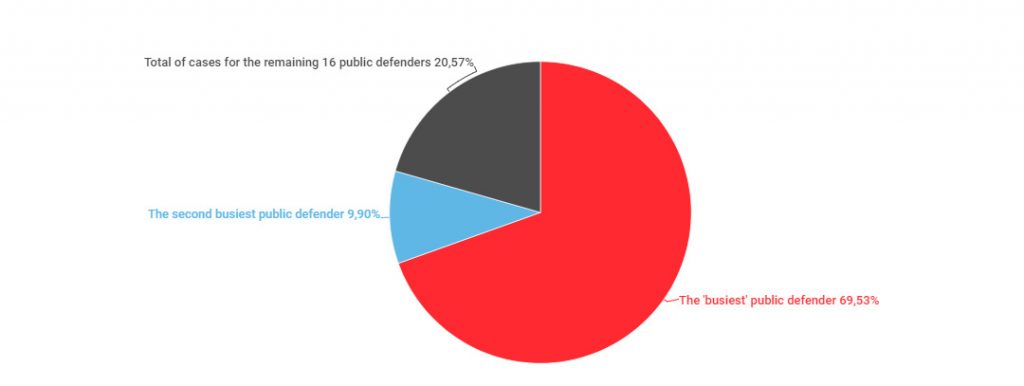The https://english.atlatszo.hu use cookies to track and profile customers such as action tags and pixel tracking on our website to assist our marketing. On our website we use technical, analytical, marketing and preference cookies. These are necessary for our site to work properly and to give us inforamation about how our site is used. See Cookies Policy
One public defender called in 70 percent of all cases in a Budapest district
Atlatszo reported last year that a private citizen filed a freedom of information request with the 19th district of Budapest and asked how many public defenders are working for the police station and how many cases each of them are given. When the police asked the citizen to pay more than 11 million Hungarian forints (more than 35,000 euros at today’s exchange rate) for the data, Atlatszo’s lawyers took the case to court. After a lengthy court battle, the numbers became public – for free. The data shows that 267 out of 384 cases were referred to the same attorney.
Until last year it was not the courts but the police that appointed lawyers when a defendant does not have the money for an attorney. That is, public defenders were police-appointed lawyers. They were paid by the government.
József Dankó, a private citizen was informed that the Budapest 19th district police station was employing only a handful of attorneys as public defenders. Dankó filed a freedom of information (FOI) request using Átlátszó’s FOI request generator site in October 2017.
The police station, instead of providing the information, asked for more than 35,000 euros, citing that it would take too much time to compile the data.
Dankó decided to sue the police and he was represented by Balázs Tóth, an attorney working for the Hungarian Helsinki Committee and Átlátszó.
Upon the first hearing, it became clear that the police station was not logging the data of the public defenders in its electric database, even though they were required to do so.
On May 24th, 2018 the Pest Central District Court ruled that the 19th district police station must provide the data to Dankó for free, but the police appealed the ruling.
The appeals court ruled in favor of Dankó, and the police finally provided him with the data on 11th January, almost a year after the first ruling.
Victory for freedom of information: police must release data on police-appointed lawyers
Freedom of information won in an important case in Hungary at the end of May.
The data revealed that in 2016 the 19th district police appointed public defenders in 386 cases. This number of cases was split between 18 public defenders. There were more than a hundred public defenders available in Hungary at the time.
However, the cases were not distributed evenly among them. The attorney that the police called most frequently represented the defendant in 267 out of the 384 cases. This means that this attorney received 69,5% of all the cases and that he or she was referred an average of 22 cases a month.
This begs the question: how was one public defender able to represent the defendants with such a heavy workload?
How was he or she able to be present of every hearing when his or her defendants were questioned?
Would he or she employ other lawyers as subcontractors? Money paid to public defenders is definitely not enough to cover that.
The second most-appointed public defender got 38 cases, while the rest of them got 79 cases, approximately 5 per year.
Controversies around police-appointed defenders
Up until last year, if a person accused of a crime was unable to hire an attorney but they were in custody, were underage, or could not speak Hungarian, the police were required to appoint a lawyer for them.
There were several problems with this system: how much can a defendant trust a lawyer who was picked by the policeman investigating him? Can the lawyer be impartial when his income depends on how many times he or she gets picked by the police?
And if you were a policeman, who would you pick: the lawyer who will do their best to defend their client, or one who will not make the life of investigators too hard?
There are well-documented cases where evidence shows that the system wasn’t working well. The Hungarian Helsinki Committee has been overseeing the field for the better part of the last two decades, and their freedom of information request back in 2008 revealed shocking data.
19 out of the 37 police stations investigated appointed the same public defender in at least a third of the cases, and in seven stations it was one public defender who got more than half of the cases.
There were also 18 police stations where the top three police-appointed lawyers got 70 percent of the cases.
An investigation done in the late 1990s showed that only about a quarter of the police-appointed lawyers met with the defendant prior to their first hearing and that the public defenders were much less active during the hearings compared to the appointed lawyers.
Written by Balázs Tóth
English version by Márk Tremmel. You can read the original, Hungarian-language story here.

Share:
Your support matters. Your donation helps us to uncover the truth.
- PayPal
- Bank transfer
- Patreon
- Benevity
Support our work with a PayPal donation to the Átlátszónet Foundation! Thank you.
Support our work by bank transfer to the account of the Átlátszónet Foundation. Please add in the comments: “Donation”
Beneficiary: Átlátszónet Alapítvány, bank name and address: Raiffeisen Bank, H-1054 Budapest, Akadémia utca 6.
EUR: IBAN HU36 1201 1265 0142 5189 0040 0002
USD: IBAN HU36 1201 1265 0142 5189 0050 0009
HUF: IBAN HU78 1201 1265 0142 5189 0030 0005
SWIFT: UBRTHUHB
Be a follower on Patreon
Support us on Benevity!

